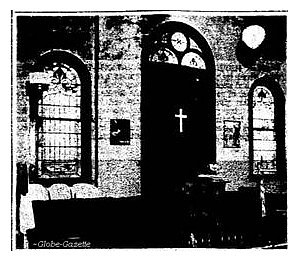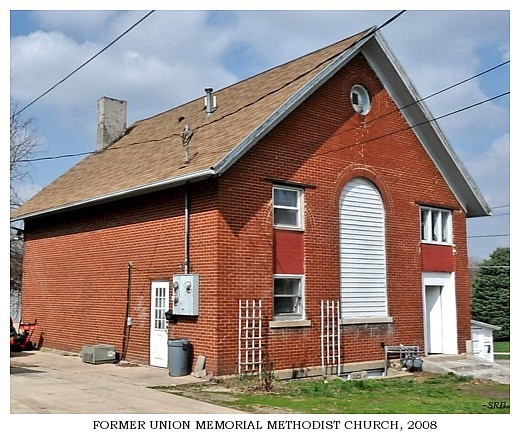


Cerro Gordo County Iowa
Part of the IaGenWeb Project
|
610 4th N.E., Mason City, Cerro Gordo County, Iowa
The Globe-Gazette, Mason City, Cerro Gordo County, Iowa
PLAGUED PIONEERS in MASON CITY
The church is the Union Memorial Methodist on the corner of 4th and Carolina N. E. The story of how this came to be is an interesting one. Intoxicating liquor had been the course of much controversy in the early days. Saloons flourished here in the rough and ready days of the pioneers, but the influence of the church finally came to bear to the extent that in 1880 the city council passed an ordinance prohibiting the sale of all intoxicating liquors in the city. Mason City's liquor ordinance came after years of repeated efforts to vote out saloons. The passage of the ordinance did not end the city's troubles. The city fathers showed signs of vacillations. The matter was finally decided when the state voted in July, 1882, to prohibit the sale of all intoxicating liquors. Mason Township voted 845 to 34 for this amendment. But for a decade preceding this event, Mason City was stirred by a controversy between the wets and the drys. The campaign to get rid of the saloons started at least as far back as 1872. In January of that year a large group of church members marched in a body to the saloons and held prayer meetings. This followed a newspaper announcement that the city council had again voted to license the saloons at $200 a year. The prayer meeting resulted in the closing of one saloon, whose proprietor joined the church. One of the early residents recalled later that "several noted conversions were made among the habitues." On Nov. 29, 1879, the city council passed Ordinance No. 79, prohibiting the sale, gift, keeping with intent to sell ale, beer, wine, cider, and other intoxicating liquor. later cider was excluded from the list and on Dec. 2 another draft of the ordinance was adopted as No. 85 and went into effect in January, 1880. On April 30, 1881, Ordinance No 86 was adopted, permitting sale of beer, malt and vinous liquors to licensed persons. The following Oct. 24, the city fathers adopted a resolution prohibiting the sale of beer or any other intoxicating drinks to a certain list of persons. For several meetings after this the council was called upon to withdraw names from this embarrassing list. The state amendment finally settled the matter, despite the fact that it was later thrown out of court on the grounds of some irregularity. At the time the law went into effect Mason City had two breweries, which, of course, immediately ceased operations. One stood on the site of the present Union Memorial Church and the other farther up the Winnebago River. The real estate records indicate the brewery industry must not have been too profitable. On the 4th and Carolina site, the business was started by Samuel Wyatt and Joseph Dorfner, who bought the property in 1871 from Daniel and Joseph Farrell. The next year Wyatt transferred his interest to John Bauman. In 1875 E. R. Lloyd got the property on a sheriff's deed, showing business was down during the big depression of the 70's. It passed successively into the hands of Michael Brahm, H. W. Burdette, Carrie Collins and Frank B. Abbott (north half) and Mike Kelly (south half). By that time it ceased to be a brewery. In the metamorphosis of the property from brewery to church, there were interesting developments. In 1889 the brewery was made into a creamery, operated by the Mason City Creamery Co. O. T. Denison was president and A. J. Miller, father of Frank Miller, secretary. In 1892 Sam and Joe Kennedy took over the business, selling to H. J. Turner in 1895. Later it became the J. D. Bickel Produce Company and in 1910 was conveyed to Helen Lester Booth, who deeded it to Hugh H. Shephard, with C. H. McNider holding half interest. On Oct. 23, 1913, Shephard and McNider sold the property to the Rev. F. W. Douglas Woodford, Negro minister. The deed was made out to the First Methodist Church, as the custodian of the property, on which the Union Memorial church was erected.
With the growth of the Negro population here the Union Memorial Methodist Church was organized Feb. 25, 1912, with seven members and a membership of 29 Sunday School children. Under the leadership of the Rev. F. D. Douglas Woodford, a lot was purchased at 4th and Carolina N. E. Members of the congregation dug out the rock and laid the foundation for the church, which was dedicated in November, 1913. 
[Section 8, Page 11] Shown above is an interior front view of the Union Memorial Methodist Church, 610 4th N.E.

Transcription by Sharon R. Becker, December of 2014
|
Return to Cerro Gordo Church Index Page
Return to Cerro Gordo Home Page